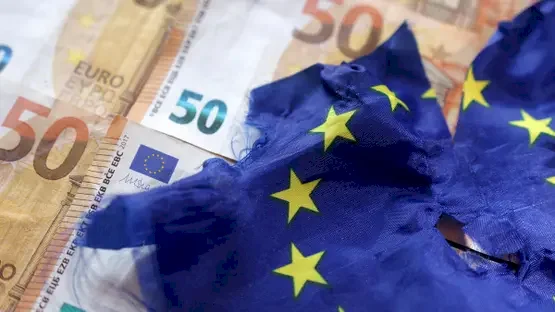
Controlling the Digital Dollar.. Could Europe Be Revived?
SadaNews - The European financial sector is witnessing a surge in blockchain technology trials, and the "SWIFT" banking network is launching a plan to create a distributed ledger, while nine banks, including "ING Groep" and "Unicredit", are preparing to launch a euro-pegged stablecoin.
The digital euro issued by the European Central Bank is nearing its debut, along with interbank settlements via blockchain technology. It’s understandable why those who experienced the belief that "Bitcoin" was bad and "blockchain" was good in 2015 may feel they have entered a time machine as described by "H.G. Wells".
Is the fear of missing opportunities resurfacing? Perhaps. Stablecoins continue to be widely used for trading more speculative tokens like "Bitcoin", even as "Citigroup" anticipates issuing up to $4 trillion in stablecoins by 2030.
But there are real wolves at the door, with Silicon Valley thirsting for a larger slice of funding extending into artificial intelligence. Cryptocurrency regulation has created competitive opportunities and launched thousands of stablecoins. And even if traditional finance lenders secretly hope none of these will come to the forefront, they are also worried about missing the chance to catch up digitally and losing more revenue if they do not participate.
Cold and Hot Wars Facing Europe
However, for Europe, the most significant change can be described as geopolitical. The rise of digital cash has provided an opportunity to reduce reliance on networks like "Visa" and "Mastercard", which some view as forms of bullying, similar to the style of Trump, while the proximity of Russian drones prompts a focus on power.
In the meantime, the cold payment war requires new weapons, as the plan for the Chinese digital yuan conflicts with the White House's determination to maintain the dollar's dominance through stablecoins.
The Digital Euro.. A Necessity for Financial System Stability in Europe
Last week, Agnes Benassi-Quire, an official at the Bank of France, warned that the Eurozone is not immune to "digital dollarization", comparing the combined 90% market share of "Tether" and "Circle Internet Group", worth $255 billion, to the duopoly of "Visa" and "Mastercard".
For a continent rich in banks but lagging in technology, this presents a call to action. Flores Loght, the CEO at "ING", which is spearheading his bank's latest efforts in stablecoins for potential use cases in the travel sector, where payments are repeated across multiple correspondent banks, remarked: "If Europe does not take the initiative to innovate, others will do so." He adds that the benefits of collaborating with other banks lie in setting standards and maintaining customer trust.
Overcoming Privacy Concerns
This also explains why the European Central Bank is moving forward with issuing the digital euro centrally, despite consumer concerns about privacy and the rejection from those believing that a model like the American one focusing on private stablecoins would suffice.
This could serve as an impetus for the financial sector to sort out its technological matters and prepare for change at multiple levels, from wholesale trading to retail, or else risk losing even more to the United States and China.
It could serve as a cornerstone towards a more integrated European payment union. And it could provide a backup option for public money in a cashless world. Describing the digital euro as a solution seeking a problem risks repeating past mistakes - in 2014, when "Apple" launched "Apple Pay", it was also described as a solution seeking a problem. Timing is the critical factor.
Stablecoins.. Will They Redefine Financial Markets?
Hence comes an optimistic scenario that this time may be completely different. Kenneth Rogoff writes in his book "Our Dollar, Your Problem": "The euro already controls a significant market share. If the digital euro develops during a time when Europe becomes more cohesive while the United States retreats, the possibility of expanding the digital euro's reach could suddenly become a reality."
However, the usual warnings apply. Money tends to fail, as do currency pegs and "blockchain" trials. The unintended consequences of radical changes could be greater shocks ahead. Perhaps it is a good thing that for every radical trial in "blockchain", there are simpler plans to modernize traditional payments, making them faster, cheaper, and more compatible.
Connecting European Payment Systems
Joachim Samuelson from "Crunchfish" payments stated that the true future of money may lie in linking existing national and regional instant payment systems, such as Brazil’s "Pix", India’s "UPI", and the Eurozone, without "blockchain" technology in sight.
No amount of digital assets will compensate for the glaring gaps in the incomplete euro union, as cross-border bank mergers continue to provoke political unease, as well as the lack of consensus on jointly issued debt.
However, a more modern sovereign payment system, built alongside companies like "Revolut" and "Klarna", could bolster Europe’s strengths. The notion of "Bitcoin" being bad and "blockchain" being good is no longer as it once was.. and that’s not a bad thing.

The Trap of High Prices: Debts Haunt Germans and Bankruptcy Knocks at Their Doors

Major Changes in the Saudi Public Investment Fund… What is Happening?

Gold Stabilizes and Heads for its Seventh Consecutive Monthly Gain

The IMF Disburses Approximately $2.3 Billion to Egypt Following Two Reviews of the "Reform...

Oil Rises Amid Expectations for Nuclear Negotiations Between Washington and Tehran

Gold prices near $5187 per ounce as tensions escalate

How Will Oil Be Affected If Tensions Between Washington and Tehran Escalate?
